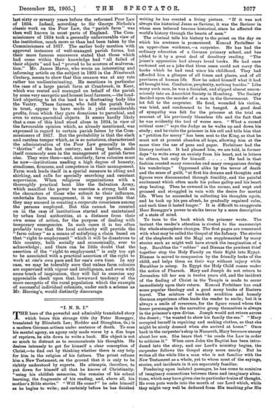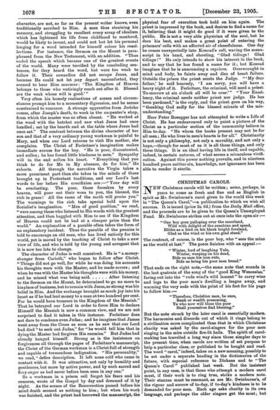writing lie has created a living picture. " If it
was not always the historical Jesus as Saviour, it was the Saviour in whom men believed become historical, since he affected the world's history through the hearts of men."
The criminal tells his history to the priest on the day on which his sentence is pronounced. Konrad Ferleitner is an upper-class workman,—a carpenter. He has had the ordinary education of a German primary school, and has added to it by a great deal of desultory reading. "The joiner's apprentice had always loved books. He had once reckoned out as a joke that three asses could not carry the books which lie bad read since his childhood. They had afforded him a glimpse of all times and places, and of all provinces of human life. Now be asked himself what it bad all brought him. Confusion; perplexity, nothing besides." Like many such men, he was a Socialist, and slipped almost uncon- sciously into an Anarchist Society in Hamburg. The Society decided upon the murder of a man in the Government. The lot fell to the carpenter. He fired, wounded his victim, was tried, and condemned to be hanged. A good deal of sympathy was felt for the prisoner at the trial on account of his previously blameless life and the fact that be was evidently the tool of worse men. " What a cursed critical case !" says the Judge as he walks up and down his study ; and he visits the prisoner in his cell and tells him that a " petition for mercy" has been sent to the King, so that he must not at present abandon all hope, allowing him at the same time the use of pens and paper. Ferleitner had the literary instinct. It had pleased him, we are told, in former days "to write away an anxiety from his heart, not in letters to others, but only for himself He had in that fashion created many comrades and many companions during his wanderings." Oppressed alike by the terror of death and the sense of guilt, "at first his dreams and thoughts and figures were disconnected through timidity, and the painful excitement which often made his pulses gallop and his heart stop beating. Then he cowered in the corner, and wept and groaned and struggled in vain with the desire for mortal life. When he succeeded in collecting his thoughts again, and he took up his pen afresh, he gradually regained calm, and each time it lasted longer." It is difficult to exaggerate Herr Rosegger's power to strike terror by a mere description of a state of mind.
To turn to the book which the prisoner wrote. The instant the reader's attention is riveted to the manuscript the whole atmosphere changes. The first pages are concerned with what may be called the Gospel of the Infancy. The stories of the shepherds and the Magi are supplemented by many stories such as might well have struck the imagination of a boy. Barabbas the " robber" and Dismas the penitent thief together stop the Holy Family on their flight into Egypt. Dismas is moved to compassion by the friendly looks of the child, and helps them on their way without injury while Barabbas is asleep. In Egypt the 'Holy Child comes under the notice of Pharaoh. Mary and Joseph do not return to Jerusalem till her son is twelve years old, and the incident of the finding of Christ in the Temple is made to occur immediately upon their return. Konrad Ferleitner has read some popular theology and a good many books of Eastern travel. The mixture of bookish erudition and homely German experience often leads the reader to smile; but it is always a smile of reverence, for the figure round whom the lesser personages in the narrative group themselves is always in the prisoner's eyes divine. Joseph would not return across the desert ; "he wanted to show his family the sea." "Mary occupied herself in repairing and making clothes, so that she might be nicely dressed when she arrived at home." Once back in the carpenter's shop in Nazareth, Mary becomes uneasy about her son. She hears that " lie reads the Law in order to criticise it." When once John the Baptist has been intro- duced into the story, and our Lord's ministry begins, the carpenter follows the Gospel story more nearly. But be writes all the while like a man who is not familiar with -the New Testament as a whole, yet to whom most of the sayings, stories, and incidents in it are separately familiar.
Pondering upon isolated passages, he has come to conceive of imaginary connections between them and imaginary situa- tions, which may have given rise to particular trains of thought. He even puts words into the mouth of our Lord which, while they might very well be deduced from His teaching plus His memory, and struggling to recollect every scrap of idealism which has lightened his life from childhood to manhood, would be likely to invent, and could not but let his personal longing for a word intended for himself colour his recol- lections. For instance, the Sermon on the Mount is para- phrased from the New Testament, with an addition. "Thus ended the speech which became one of the greatest events of the world. Many were terrified by the concluding sen- tences, for they heard the word, but were too weak to follow it. Their cowardice did not escape Jesus, and because He could not let any depart uncomforted, they seemed to hear Him murmur : 'The Kingdom of Heaven belongs to those who untiringly reach out after it. Blessed are the weak whose will is good.' " Very often his homely realisations of scenes and circum- stances prompt him to a momentary digression, and he seems constrained to romance. A strange apprentice from Jericho comes, after Joseph's death, to work in the carpenter's shop, from which the master was so often absent. "He worked at the wood with the hatchet and saw what Jesus had once handled ; sat by the hearth and at the table where Jesus had once sat." The contrast between the divine character of her son and that of a very ordinary young workman is painful to Mary, and when our Lord returns to visit His mother, she complains. The Christ of Ferleitner's imagination makes immediate excuse for the boy. "He is poor, discontented, and sullen; he has found little kindness in men." Sympathy will in the end soften his heart. " Everything that you think to do for Me in My absence, do for him," He exhorts. All through the narrative the Virgin takes a more prominent part than she takes in the minds of those brought up in Protestant traditions, and our Lord's last words to her before His crucifixion are :—" Your day will be everlasting. The poor, those forsaken by every heaven, will pour out their woes to you, the blessed, the rich in grace ! All the races of the earth will praise you." The warnings to the rich take special hold upon the Socialist's imagination. " Men of good position," we read, " were among those who listened to His words with the greatest attention, and then haggled with Him to see if the Kingdom of Heaven could not be had at a cheaper price than the world." An explanation of a parable often takes the form of an explanatory incident. Thus the parable of the pennies is told to encourage an old man, who has lived entirely for this world, yet is moved by the teaching of Christ to take a new view of life, and who is told by the young and arrogant that it is now too late to change.
The character of Judas is well conceived. He is " a money- changer from Carioth," who began to follow after Christ. "Things did not go well, for while he was doing his accounts his thoughts were with the Master, and he made errors ; and when be was with the Master his thoughts were with his money, and he missed what was being said After listening to the Sermon on the Mount, he determined to go no more to his place of business, but to remain with Jesus, so strong was his belief in Him. And the exchange brought as much joy into his heart as if he had lent money to a man at two hundred per cent. For he would have treasure in the Kingdom of the Messiah." That he betrayed our Lord in order to force Him to declare Himself the Messiah is now a common view, and we are not surprised to find it taken in this instance. Ferleitner does not dare to condemn even Judas ; and he imagines that James went away from the Cross as soon as he saw that our Lord had died "to seek out Judas," for "he would tell him that in dying the Master had forgiven His enemies." But Judas had already hanged himself. Strong as is the insistence on forgiveness all through the pages of Ferleitner's manuscript, the Christ of the German workman is a Christ full of strength and capable of tremendous indignation. "His personality," we read, " defies description. It left none cold who came in contact with it. It was attractive, not only by humility and gentleness, but more by active power, and by such sacred and fiery anger as had never before been seen in any one."
So a workman in a prison cell forgot his fears and his remorse, wrote of the Gospel by day and dreamed of it by night. As the scenes of the Resurrection passed before his mind death seemed as nothing to him ; but when his work was finished, and the priest had borrowed the manuscript, the
physical fear of execution took hold on him again. The priest is impressed by the book, and desires to find a name for it, believing that it might do good if it were given to the public. He is not a very able physician of the soul, but be does his best, and makes a great point of entering the prisoners' cells with an affected air of cheerfulness. One day he comes unexpectedly into Konrad's cell, waving the manu- script in his hand, and shouting, " Glad tidings ! Glad tidings !" He only intends to show his interest in the hook, and to say that he has found a name for it ; but Konrad imagines that he is announcing a reprieve. Overwrought in mind and body, he faints away and dies of heart failure. Outside the prison the priest meets the Judge. " My dear father,' he said hoarsely, I am sorry, you will have a heavy night of it. Ferleitner, the criminal, will need a priest. To-morrow at six o'clock all will be over. " "Your Excel- lency, the criminal needs neither priest nor judge. He has been pardoned," is the reply, and the priest goes on his way, " thanking God sadly for the blessed miracle of the mis- understanding."
Herr Peter Rosegger has not attempted to write a Life of Christ. He has endeavoured only to paint a picture of the Christ as a particular section of the community believe in Him to-day. "He whom the books present may not be for all men ; He who lives in men's hearts is for all." Christianity is not only a philosophy, not only a morality, and not only a hope,—though for most of us it is all these things, and only these things. It is an ideal having life in itself, and capable, indeed, in certain natures, of what seems a miraculous vivifi- cation. Against this power nothing prevails, and in nineteen hundred years neither sin, knowledge, nor ignorance has been able to render it sterile.







































 Previous page
Previous page